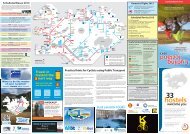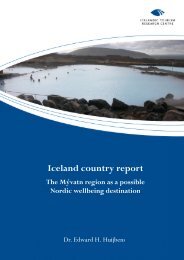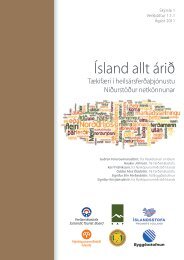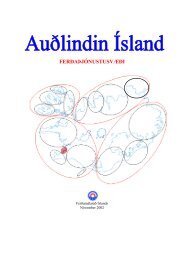Untitled
Untitled
Untitled
You also want an ePaper? Increase the reach of your titles
YUMPU automatically turns print PDFs into web optimized ePapers that Google loves.
As evidenced by the Davos Declaration, sustainability and<br />
sustainable development have emerged as dominant concepts of tourism,<br />
also in various more concrete attempts to locally guide, steer, and change<br />
tourism in practice into a more environmentally friendly business. But, as<br />
Saarinen argues, it is “important to realize that sustainability is not a oneway<br />
street in the global-local nexus” (Saarinen 2006, p. 1134). The issue<br />
of climate change in tourism is not only related to behaviours and actions<br />
at a particular destination. As pointed out by Bramwell and Lane<br />
“sustainable tourism is now seen as more than just a destination issue; it is<br />
a total trip problem of global relevance to climate change (Bramwell and<br />
Lane 2008, p. 1). It has been demonstrated by several studies that:<br />
tourists consume greater amounts of energy, water and materials in<br />
tourism destinations than they do at home. This consumption behaviour<br />
significantly limits opportunities for greater sustainability. At the very<br />
least then, less consumptive tourist behaviours are required if the<br />
sustainable tourism challenge is to be met (Williams and Ponsford 2009,<br />
p. 398).<br />
Nearly 25 years since the Brundlandt report, “sustainable tourism<br />
development outcomes remain problematic and continue to evoke emotive<br />
debate” (McDonald 2009, p. 455). One fundamental reason is that tourism<br />
in itself represents a mobility that is deeply problematic in the context of<br />
climate change. As Hall observes:<br />
All demand and supply facets of tourism are effected by climate change,<br />
but just as importantly tourism has direct and indirect effects on climate<br />
change itself over all stages of mobility. Conceptualising tourism in<br />
terms of wider aspects of human mobility therefore has considerable<br />
importance with respect to assessing the complete impacts of tourism on<br />
climate change (Hall 2005, p. 341).<br />
For tourism it is especially problematic that its mobility has so far<br />
been fossil-fuel driven, notably cars, buses and aeroplanes. The question at<br />
stake is how tourism can be sustained without the carbon supplies that are<br />
its lifeblood? In all strategies for mitigating climate change reducing<br />
carbon use within transport is crucial, it accounts for 14% of total<br />
greenhouse gas emissions (Dennis and Urry 2009, p. 9). As pointed out by<br />
Hall, “[a]ny strategy towards sustainable tourism must thus seek to reduce<br />
transport distances, and vice versa” (Hall 2005, p. 344). Low carbon<br />
78
















